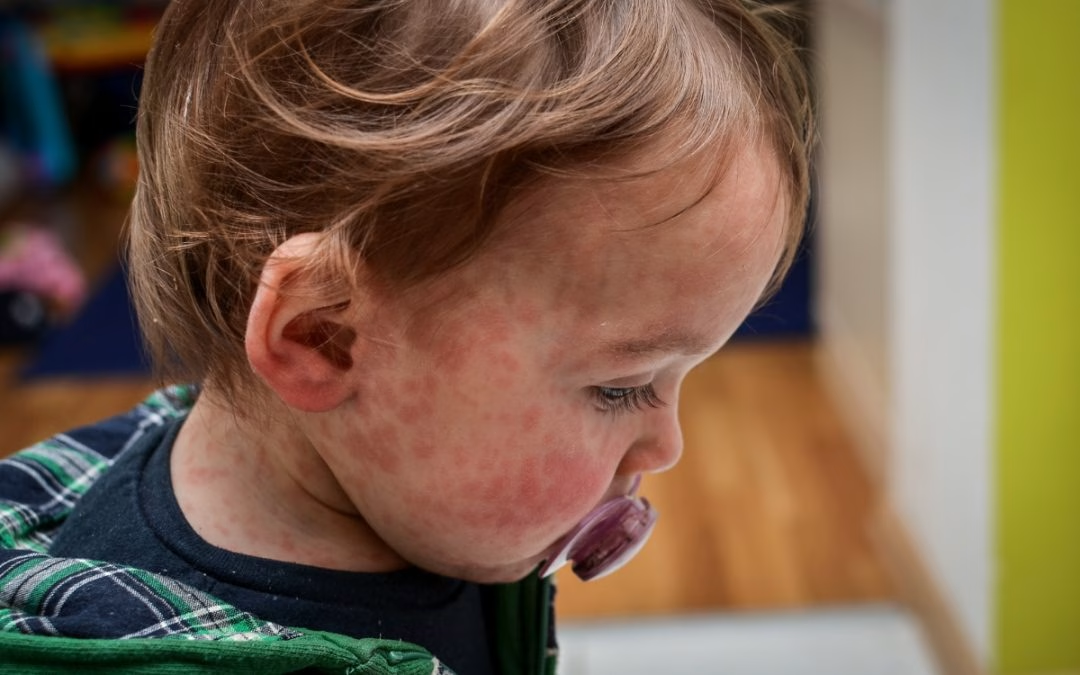
Spring afternoons in Cleveland are best spent strolling through spots like Bradley Square Mall, grabbing local treats, and enjoying the warm, lively atmosphere. But as families gather and children play, a concerning health issue is making headlines across the country: a growing measles outbreak is spreading through parts of the United States, raising important questions about how to protect our children.
With cases rising in states like Texas, Oklahoma, and New Mexico, staying informed and taking preventive steps is critical. Here’s what you need to know about measles, why outbreaks are happening now, and how you can help protect your child during this time.
What Is Measles?
Measles, also known as rubeola, is a highly contagious viral infection that primarily targets the respiratory system. It spreads easily through coughing, sneezing, or direct contact with an infected person. What’s especially concerning is that the virus can linger in the air for up to two hours after an infected person has left a space, making it incredibly easy to contract without direct contact.
Symptoms usually develop 7–14 days after exposure and often include:
- High fever (often over 101°F)
- Cough, runny nose, and red eyes, commonly called the “three C’s”
- Tiny white spots inside the mouth (Koplik spots)
- A red rash that starts on the face and moves downward about 3–5 days after fever begins
Measles isn’t just uncomfortable, it can lead to serious complications like pneumonia, encephalitis (brain swelling), and even death, particularly in young children, pregnant women, and people with weakened immune systems.
Why Are Measles Outbreaks Happening Now?
Measles was declared eliminated from the United States in 2000, but unfortunately, vaccination rates have dropped in recent years. Several factors contribute to this decline, including:
- Vaccine misinformation and hesitancy
- Limited healthcare access
- Disruptions caused by the COVID-19 pandemic
When fewer people in a community are vaccinated, measles can spread rapidly. In fact, if one person contracts measles, up to 90% of unvaccinated individuals nearby can become infected. With the recent surge in cases, health officials are warning that more outbreaks could happen if vaccination coverage doesn’t improve, especially as international travel and large gatherings increase.
How Does Measles Spread?
Measles is one of the most contagious viruses known and spreads through:
- Airborne transmission: Breathing contaminated air
- Surface contact: Touching contaminated surfaces where the virus can live for several hours
- Direct contact: Touching an infected person or their belongings
Because of how easily it spreads, simply sharing the same space with an infected person, at a grocery store, play center, or even a waiting room, can be enough to contract the virus.
How to Protect Your Child During the Measles Outbreak
Protecting your child during this outbreak starts with vaccination and includes a few additional important steps:
1. Make Sure Your Child Is Vaccinated
The MMR vaccine (measles, mumps, and rubella) is the most effective way to prevent measles. Two doses of the MMR vaccine are about 97% effective at preventing measles.
The CDC recommends:
- First dose: Between 12 and 15 months of age
- Second dose: Between 4 and 6 years of age
If your child hasn’t received both doses, now is the time to catch up. Even teens and adults who missed vaccinations can benefit from getting immunized.
2. Stay Alert for Symptoms
If your child shows any early signs of measles: high fever, cough, runny nose, red eyes, or a rash, it’s important to act quickly:
- Contact an AFC healthcare provider right away
- Isolate your child from others to prevent the virus from spreading
- Follow your provider’s recommendations for testing, treatment, and isolation
Early action can help limit the spread to others and ensure your child gets the care they need.
3. Practice Good Hygiene and Safety Measures
While vaccination is the best defense, other preventive steps can help lower your family’s risk:
- Handwashing: Teach your child to wash hands frequently with soap and water.
- Masking: If you are in a high-risk environment or around others who are sick, wearing a mask can add an extra layer of protection.
- Surface cleaning: Regularly disinfect frequently touched surfaces, especially if anyone is showing signs of illness.
4. Limit Exposure During Outbreaks
If measles cases are confirmed in your community, consider limiting your child’s exposure to crowded indoor spaces, especially if they are too young to be fully vaccinated.
How AFC Cleveland Can Help
At our clinic, we are committed to helping protect your family from preventable illnesses like measles. Our clinic offers:
- MMR vaccinations to keep your child protected
- Immunization record reviews to ensure your child is up to date
- Prompt evaluation and testing if you are concerned about possible measles symptoms
Walk-ins are welcome, and our caring providers are here to answer your questions, offer guidance, and provide the care your family needs, all with minimal wait times.
Final Takeaway
The recent measles outbreak is a serious reminder of how important vaccines are in protecting not just individuals, but entire communities. By ensuring your child is fully vaccinated, staying alert for symptoms, and following good hygiene practices, you can help keep your family, and all of Cleveland, healthy and safe.
AFC Cleveland stands ready to support you every step of the way. Whether you’re updating vaccinations or seeking care for your child, our team is here to help you navigate this challenging time with confidence.